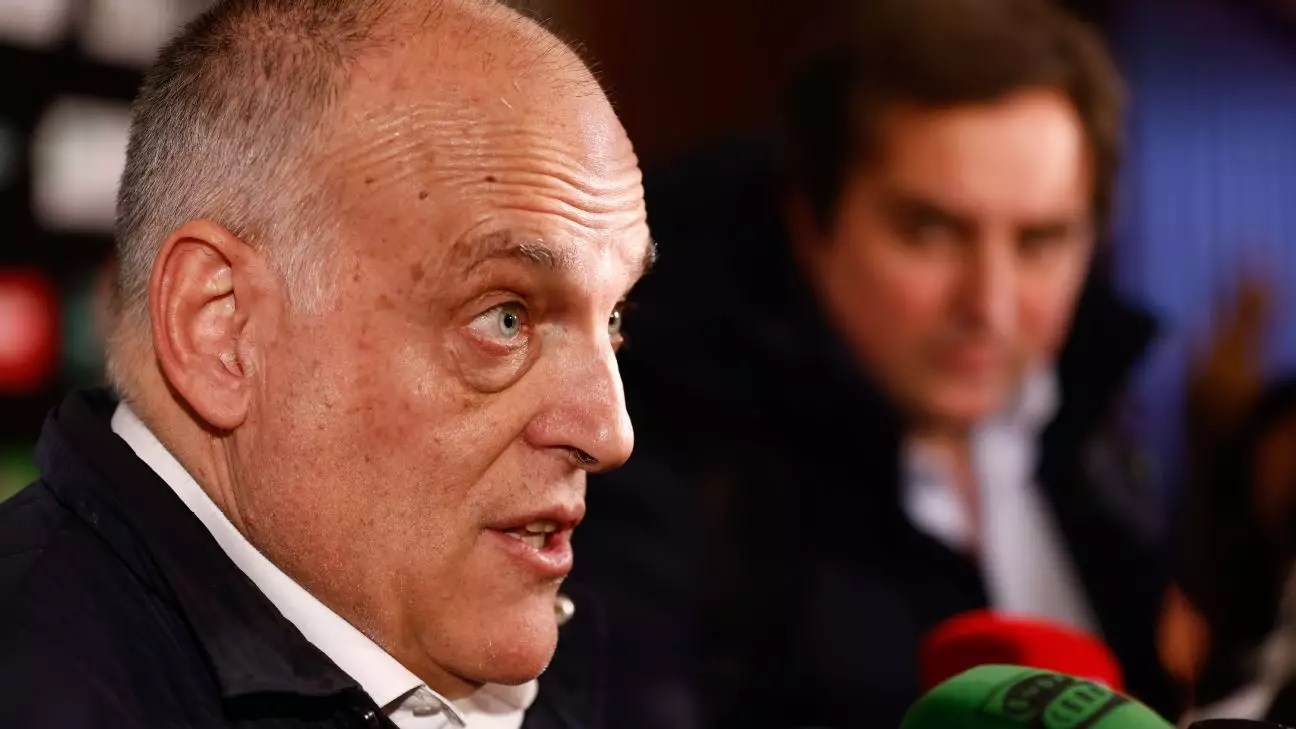The world of football is often fraught with passion, drama, and controversy, but the latest developments in LaLiga have elevated tensions to a new level. The ongoing dispute between Real Madrid and LaLiga president Javier Tebas has revealed deep divides regarding officiating and perceived injustices within the league. This article delves into the statements made by Tebas, the reactions from Real Madrid, and what this feud signifies for Spanish football.
Accusations and Defensiveness: The Core of the Conflict
Javier Tebas has openly criticized Real Madrid for what he describes as “crying” over officiating decisions. In a recent statement to Europa Press, he expressed his dismay over what he perceives as the club fabricating a “global conspiracy theory” against them. Real Madrid’s vocal complaints about refereeing decisions have not only been expressed through media channels but have become a central theme in their narratives following less favorable match outcomes.
Tebas accused the club of constructing a fabricated narrative where they portray themselves as the underdogs battling against perceived injustices. He suggested that this mindset undermines the integrity of both LaLiga and its other clubs, explaining that claims of conspiracy are insulting to teams that face struggles without attributing them to external forces. This defense of the competition illustrates the ongoing tensions between a club with a storied history and a governing body that aims to maintain order and fairness within the league.
The Open Letter and Its Implications
The conflict escalated when Real Madrid sent an open letter to the Royal Spanish Football Federation (RFEF), accusing referees of “manipulation and adulteration” of the competition. This bold move indicates a critical juncture in the relationship between the club and the league’s regulators. Tebas, taking a firm stance, asserted that such accusations damage the reputation of LaLiga and its clubs. His assertion that these complaints create unnecessary chaos speaks volumes about the delicate balance of governance and club autonomy within professional football.
Real Madrid’s continuous appeals against officiating decisions and allegations of unfair treatment may resonate with fans, but it risks alienating them from other clubs. In football, every fan gravitates towards a certain level of loyalty, and the insistence on external conspiracy could, in reality, diminish the credibility of the club’s own successes and failures.
Tebas also addressed the growing unrest among Real Madrid fans, specifically referencing the chants such as “Tebas, stop stealing from us” that echoed in their home stadium following a recent win. His dismissal of these objections as “prepared” reflects an alarming trend in football where the voices of fans are either disregarded or manipulated. He questioned the rationale behind these chants, asking, “What are we stealing from them?” This underscores the discontent fans feel and reveals a larger disconnect between the club’s management and its supporters.
Furthermore, the controversy extends beyond refereeing complaints, as it also involves issues of regulatory compliance within LaLiga. Tebas has remained firm in his belief that the league must uphold its financial fair play rules, evidenced by his opposition to Dani Olmo’s situation at Barcelona. After Olmo’s initial registration was overturned due to Barcelona’s failure to meet regulatory deadlines, the subsequent reinstatement led to further questions about LaLiga’s authority and the proper functioning of its regulations.
The ongoing spat between Real Madrid and Javier Tebas symbolizes a deeper struggle within LaLiga—one that could have implications beyond the immediate concerns of officiating and financial governance. Football is about more than just the game; it is about trust, integrity, and the collective narrative that defines the sport. If clubs begin to view themselves as victims of a systematic bias, it could engender a culture of paranoia that undermines competition.
In the larger context of Spanish football, these controversies may serve as a bellwether for what lies ahead. Will clubs continue to air grievances publicly, or will the leadership find a path towards maintaining professionalism and solidarity for the sake of the league? As fans and stakeholders of LaLiga watch this conflict unfold, the need for unity in navigating the complexities of modern football becomes increasingly evident.
The critiques made by Javier Tebas towards Real Madrid reveal the multifaceted challenges inherent within managing one of the world’s most celebrated football leagues. The penchant for dramatic claims and grievances threatens to obscure the essence of the sport, which should celebrate competition instead of division. As this narrative continues to evolve, all parties involved may need to consider the potential consequences of their actions on the future of LaLiga.


Leave a Reply